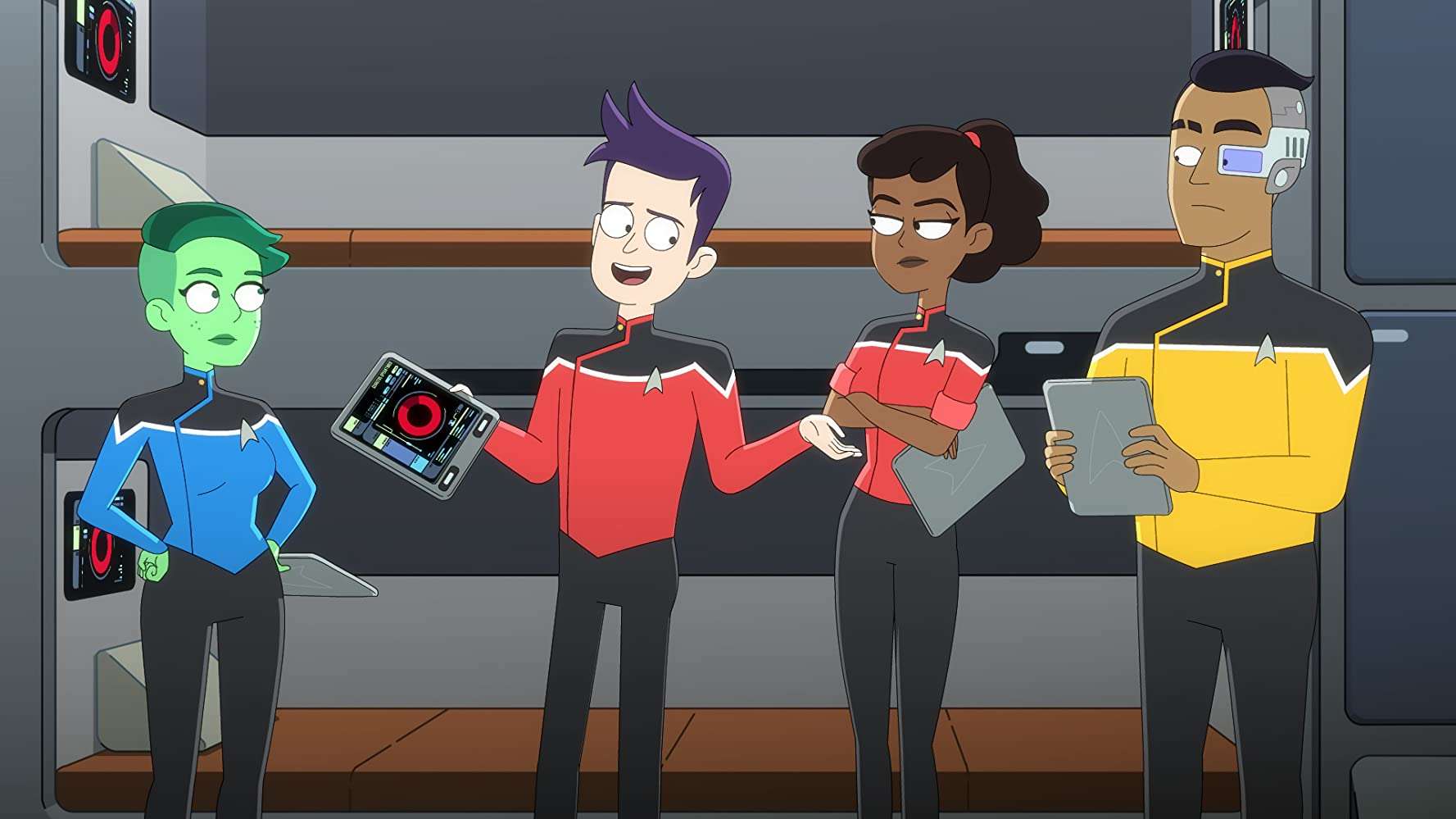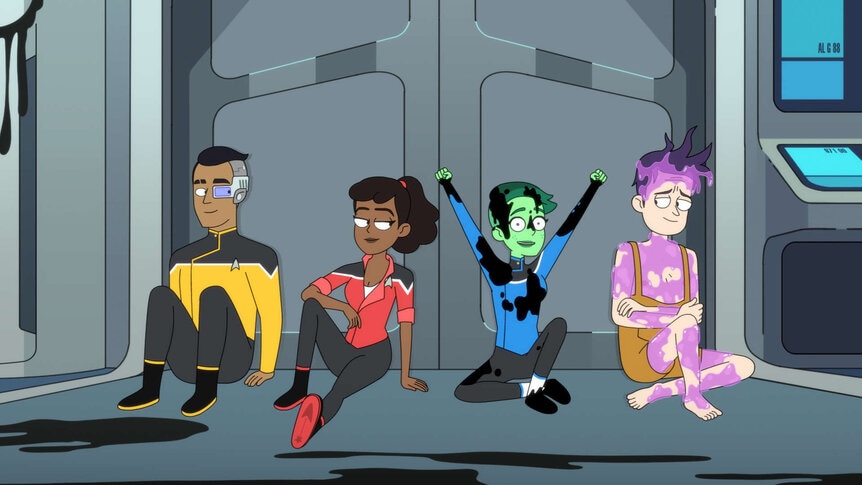Create a free profile to get unlimited access to exclusive videos, sweepstakes, and more!
How Lower Decks is boldly exploring the future of Star Trek

Contrary to what a contingent of “old school” Star Trek fans say on social media, Star Trek: Lower Decks is not an unnecessary detour for the franchise, but rather an essential stepping stone that furthers the diverse and inclusive mission statement Star Trek pioneered nearly 55 years ago.
While it’s easy to dismiss this certain section of fandom’s negative echo chamber with a “shut up, Boomer” meme, it’s important to understand and empathize with where their resistance to Star Trek’s first animated series in 47 years comes from. Trekkers expect new Trek shows to follow the tried-and-true format to which the last five decades have conditioned them: the live-action exploits of a crew predominantly using a starship as means to boldly go where no one has gone before (minus the other shows that have already done so).
People always fear what they don’t understand, or — in the case of Lower Decks — want to give a chance to try to understand before even seeing an episode. With that in mind, it’s not surprising that Lower Decks was met with some backlash from a passionate fanbase with a very specific vision for the stuff they love to see. (As a Trek fan for over 30 years, I know that contingency well.) But six episodes into the CBS All Access show’s first season, it’s clear that not only is that backlash unwarranted, but it is also, quite frankly, embarrassingly, painfully opposed to the very DNA of the property the fans supposedly “get” and love.
With Lower Decks choosing to center its narrative on the U.S.S. Cerritos’ junior-grade contingent of officers who do the “grunt work," which includes follow-ups on first contact missions or holodeck waste disposal (gross), audiences are seeing a part of the Star Trek experience that’s never really been dramatized before (outside of Star Trek: The Next Generation's Season 7 episode, “Lower Decks”). The “Infinite Diversity in Infinite Combinations” (IDIC) mantra that fans of the series supposedly uphold and admire is the fuel driving Lower Decks’ story engine, but in “similar but different” ways than previous series. That narrative choice is a feature, not a bug.
Furthering the Trek mandate of “seeking out new life” manifests in the lead cast charged with the more bureaucratic/”busy work” concerns of that search. The show intentionally relegates “Bridge crew” plots to the episode’s “C” story, with the “A” and “B” stories helmed by the Lower Decks folks taking the center seat. By focusing on a more relatable and diverse cast — that includes the charming and snarky Ensign Mariner (voiced by the exceptional Tawny Newsome), her best friend, Ensign Boimler (Jack Quaid), who is basically the Final Frontier’s purple-haired version of Parks and Recreation's Ben Wyatt — Lower Decks presents Trek fans with the first ensemble of lead characters that literally speaks their language. (Mariner and Boimler’s dialogue is often full of either name drops of Trek royalty, like Kirk, or easter-egg-y references to legacy aliens like Star Trek: Enterprise's Suliban). Our heroes are just as big fans of Star Trek and its deep bench of adventures as those watching it. This is an inspired meta touch that, in retrospect, makes the initial fan outcry even more disheartening.
Few Star Trek shows come out of the gate as fully formed as Lower Decks has in its first season; the only other Trek that’s comparable is The Original Series’ Season 1. And as the original adventures of the Enterprise did with Kirk, Spock, and McCoy, Lower Decks invests Mariner and Boimler’s dynamic with a similar emotional core you can’t help but invest in. They are the beating heart of this show, further proving that Star Trek is often one of the best places on TV to find the best stories about colleagues having platonic friendships that feel like our own despite the extraordinary, sci-fi circumstances surrounding them.
No episode of Lower Decks so far best exemplifies this than its finest outing yet, Episode 5, “Cupid’s Errant Arrow.” Mariner’s relentless search for why Lt. Barb Brinson (Gillian Jacobs) is doubling down on a long-distance romance with her good pal, “Bradward” Boimler, is as hilarious as it is heartwarming. She suspects Barb is some kind of alien or alien parasite, luring Boimler with some extraterrestrial mojo, because something just doesn’t feel right about the relationship. What, at first, starts out as potentially mean-spirited on Mariner’s part reveals itself to be out of legit care and concern for her friend and his feelings — albeit in Mariner’s usual overzealous way. She cares so much about the potential heartbreak and disappointment her friend may face that she’s willing to go out of her way to protect him from that — even if, in the short term, she causes her friend a touch of the very thing she’s trying to avoid. Barb and Mariner’s conflict that results from the latter’s tenacity eventually evolves into the two forming a friendship over the very person who put them at odds to begin with.
By episode’s end, Boimler and Barb break up, but it’s done in an earned way that doesn’t violate the emotional logic of the story or the characters’ true natures that service it. In fact, as one relationship ends another is made stronger as Boimler and Mariner — two people so different in their approaches to Starfleet life — find that it is their differences that make them better, stronger friends.
“Cupid’s Errant Arrow” is a near-perfect balance of humor, heart, references, and tried-and-true Trek narrative tropes that pushes Trek forward through character while honoring all that came before. In doing so, the episode makes a strong case that, like all Star Trek series, Lower Decks is worth investing in as a key event in the evolution of a franchise that has taught its fans that if there’s an ideal or cause worth dedicating oneself to, it’s that of moving forward — together.















